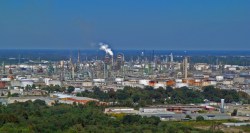
Mike SmailExxonMobil’s accident-prone complex in Baton Rouge.
“Oops.”
Gulf Coast oil refiners and chemical processors say that a lot, but regulators are doing precious little to rein in what the industry euphemistically calls “upset” emissions.
Upset emissions are inadvertent releases of chemicals by industrial operations when something goes awry. And things seem to go awry awfully frequently. An ExxonMobil refinery in Baton Rouge, La., was averaging two accidental releases every week during one grim stretch.
That’s according to an analysis by The Center for Public Integrity, which found that upset emissions are more prevalent than industry admits or government knows. Some highlights from the center’s investigative report:
[A 411-barrel chemical leak last year] has played out again and again at the sprawling, 2,400-acre ExxonMobil Baton Rouge complex, which encompasses an oil refinery and a chemical plant, and dwarfs the Standard Heights community. The leak marks the 1,068th upset emissions event at the compound in the last eight years, according to a database of incident reports compiled by the Bucket Brigade. Of these events, 172 involved benzene, a carcinogen that can trigger headaches, dizziness and rapid heart rate.
Exxon’s chemical plant had 265 of all incidents. At the refinery, the data show 803 accidental releases over these years; at its height, the facility averaged two a week. …
The steady hazards extend far beyond Baton Rouge. In the Gulf states of Texas and Louisiana, the vast number of plastics, power and gas plants provide an on-the-ground case study of a national problem.
“Non-routine” upset emissions have become regular occurrences at oil refineries, chemical plants and manufacturing facilities.
The upset emissions can pose serious health risks, but the oil and chemical companies say there’s nothing to worry about.
Dr. Mark D’Andrea, at the University of Texas Cancer Center, began tracking 4,000 residents exposed to the poster child of all upsets — the “40-day Release” at the BP refinery, in Texas City, which belched 514,795 pounds of benzene and 20 other pollutants throughout the spring of 2010. Earlier this year, D’Andrea unveiled preliminary data showing the residents have “significantly higher” white-blood cell and platelet counts than their Houston counterparts. The data suggests BP’s release may have increased their risk of developing such cancers as leukemia, the doctor says.
In a statement, BP says it does “not believe any negative health impacts resulted from” its 40-day release. “To our knowledge, the University Cancer Centers’ pilot study does not support a claim for any plaintiff alleging injury from that flaring and has no relevance to those claims,” the company wrote, referring to pending litigation filed by 47,830 residents and workers against BP alleging health ailments caused by the release. D’Andrea has not been hired as an expert witness for either side in the case, but has testified in pre-trial discovery.
For more, read the full report in all its grotesque glory.




